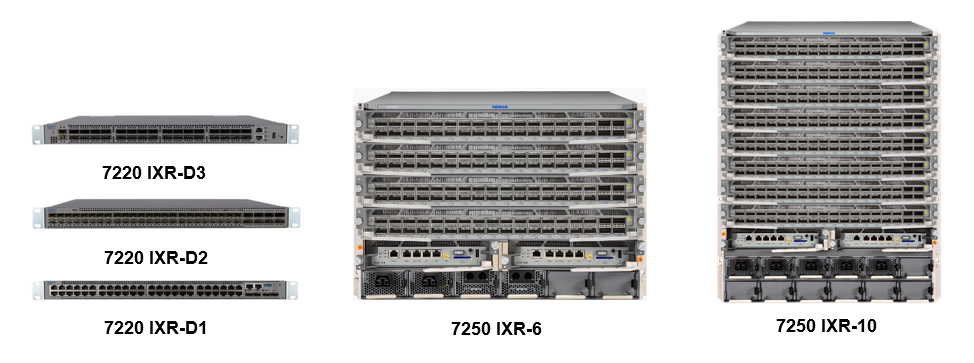3. Hardware overview
The SR Linux software supports five hardware platforms:
- 7250 IXR-6
- 7250 IXR-10
- 7220 IXR-D1
- 7220 IXR-D2
- 7220 IXR-D3
Figure 4 shows the 7250 IXR-6, 7250 IXR-10, and 7220 IXR-D platforms.
Figure 4: SR Linux hardware platform offerings

3.1. 7250 IXR-6 and 7250 IXR-10
The SR Linux is supported on the Nokia 7250 IXR-6 and 7250 IXR-10 chassis platforms. Table 3 summarizes the specifications of both products.
Table 3: 7250 IXR-6 and 7250 IXR-10 specifications
Parameter | 7250 IXR-6 | 7250 IXR-10 |
Height | 7 RU | 13 RU |
Depth | 81.28 cm | 81.28 cm |
Number of IMM Slots | 4 | 8 |
Slot Capacity | 9.6T FD | 9.6T FD |
Maximum System Capacity per Chassis | 76.1T HD or 115.2T HD with local switching | 153.6T HD or 230.4T HD with local switching |
3.1.1. Architecture
The 7250 IXR-6 and 7250 IXR-10 platforms deliver capabilities that include IP routing, Layer 2 Ethernet, QoS, router security, scalable telemetry and model-driven programmability. Flexible traffic management includes big buffering, per-port queuing, shaping and policing.
Each chassis uses an orthogonal direct cross-connect architecture, with integrated media modules (IMMs) connecting in front and switch fabrics and fans connecting at the rear. The lack of a backplane, midplane or midplane connector system provides a compact chassis design, optimal cooling and easy capacity upgrades.
3.1.2. Chassis components
The 7250 IXR-6 and 7250 IXR-10 chassis include fan trays, power supply units (PSUs), control processing modules (CPMs), switch fabric modules (SFMs), and IMMs. The two products vary in system capacity, height, and number of IMM slots. Table 3 summarizes the differences between the 7250 IXR-6 and 7250 IXR-10.
The system uses a complete Faraday Cage design to ensure EMI containment, a critical requirement for platform evolution that will support next-generation application-specific integrated circuits (ASICs). The routers are high-density, high-performance modular devices that are designed for data spine deployments. They provide hardware support for 400GE, 100GE, 40GE, 25GE, and 10GE interfaces for intra-fabric and server connectivity.
3.1.3. Power and cooling
The 7250 IXR-6 and 7250 IXR-10 have dual fans that support front-to-back airflow. The fan design is made of a stainless-steel orthogonal mesh honeycomb placed in front of the line card for air intake. The perforation rate in the honeycomb is approximately 90% which allows a large surface area that is exposed to cool air causing a reduction in power consumption.
The products can also be AC or DC powered. The DC supply has hot-swappable and load-sharing PSUs. The PSUs are N+M power redundant and each PSU is cooled by a fan independent of the chassis fans. The IXR-6 has a maximum of 12 PSUs and the IXR-10 has a maximum of 12 PSUs.
3.2. 7220 IXR-D1, 7220 IXR-D2, and 7220 IXR-D3
SR Linux is supported by the 7220 IXR-D1, 7220 IXR-D2 and 7220 IXR-D3 platforms. Table 4 summarizes the features of these routers.
Table 4: 7220 IXR-D1, 7220 IXR-D2, and 7220 IXR-D3 Specifications
Parameter | 7220 IXR-D1 | 7220 IXR-D2 | 7220 IXR-D3 |
Height | 1 RU | 1 RU | 1 RU |
Depth | 40 cm | 46 cm | 46 cm |
System Capacity | 88G | 2T | 3.2T |
3.2.1. Architecture
The 7220 IXR-D series routers are high-performance, high-density, fixed configuration devices designed for data center leaf-spine deployments. The 7220 IXR-D series platforms deliver capabilities including IP routing, Layer 2 switching, QoS, router security, scalable telemetry, and model-driven management.
3.2.2. Chassis components
The 7220 IXR-D platforms vary in system capacity, and height. Table 4 outlines the differences between 7220 IXR-D1, 7220 IXR-D2, and 7220 IXR-D3. They provide high-density QSFP28/QSFP+/SFP28/SFP+/SFP/RJ-45 ports. The router supports native 100GE, 50GE, 40GE, 25GE, 10GE, and 1GE port options.
3.2.3. Power and cooling
The platforms are equipped with N+1 hot-swappable fans with both front-to-back and back-to-front airflow for cooling. The IXR-D1 has three fan modules, IXR-D2 has four fan modules and the IXR-D3 has five fan modules.
The power supplies can powered by either dual removable AC units or DC supply units. The 7220 IXR-D series platforms support two power supplies with 1+1 redundancy.